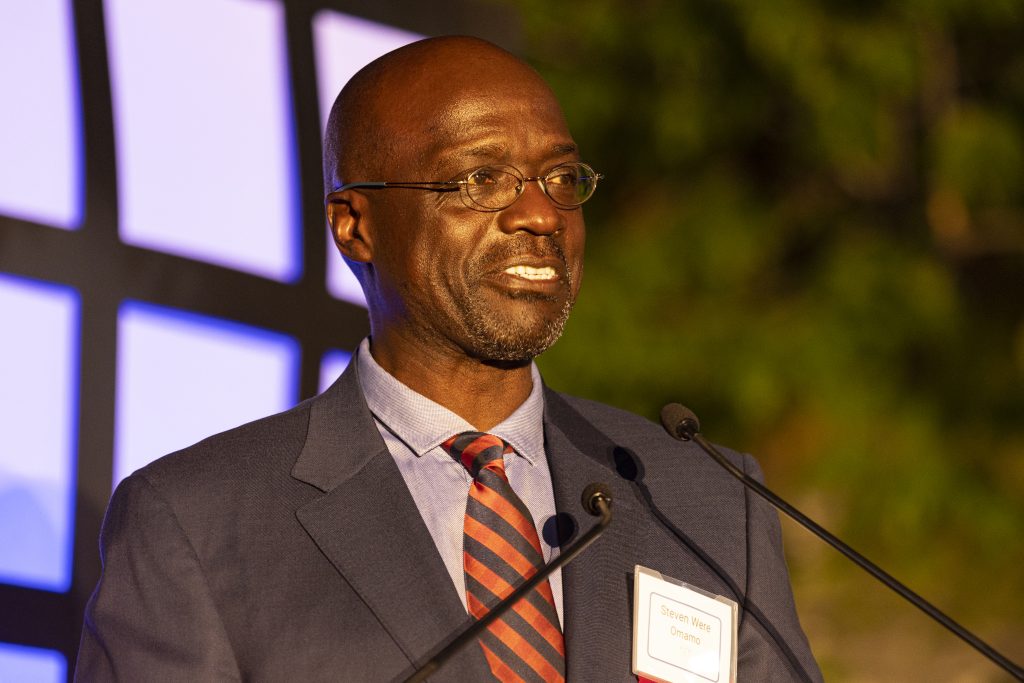Former United Nations’ World Food Programme (WFP) Country Representative in Ethiopia, Dr. Steven Were Omamo, is scheduled to be the Hot Seat News guest speaker on a Twitter Spaces Interview on Tuesday, November 8, from 10 am PST.
Links to the Twitter Space Below:
Twitter Spaces on Tuesday Nov 8
10 am | 9pm EAT
Topic: Focus on Crisis and Transformation in EthiopiaSpeaker: @swomamo Dr. Steven Were Omamo, CEO NGI, Former WFP Director in Ethiopia | Nobel Prize 2020. Author: At The Center Of The World in Ethiopia.https://t.co/gYGe7cVBSb
— Maurice Ndole (@MauriceNdole) November 4, 2022
A Kenyan native and world-renowned agrifood expert, Omamo is perhaps one of the most accomplished Africans in the world.
He currently serves as the CEO of New Growth International (NGI), a management consulting firm he co-founded in 2007 with his wife, Cheryl. NGI advises and educates clients in the agrifood and education industries, helping them to find innovative solutions and improve performance in their fields.
Tuesday’s topic of discussion is Crisis and Transformation of Ethiopia, but Omamo is also expected to discuss his new best-selling book, At the Center of The World In Ethiopia. The book is based on his experience serving as the WFP Director in Ethiopia.
In the book, dedicated to 14 WFP colleagues who died in the field, Omamo gives a candid account of his successes and challenges in the WFP and working with the United Nations.
He recounts the 2019 tragedy of the Ethiopian Airlines ET 302 crash, which crashed minutes after takeoff from Addis Ababa for Nairobi, killing all 157 people on board, including 8 WFP employees.
The HSN-Omamo discussion comes just days after mediators, former Presidents Uhuru Kenyatta of Kenya and Olusegun Obasanjo of Nigeria, succeeded in getting warring parties in the Ethiopian-Tigray conflict to make a public commitment to a cease-fire in the war that has lasted almost 3 years.
While there’s optimism that peace will finally return to the region, hope is fading. The BBC reports uncertainty remains after talks scheduled for this weekend failed to occur, and the fighting continued.
Omamo was in charge of WFP operations in Ethiopia when the war broke out. He recounts several incidents where both sides of the conflict treated him with suspicion, blaming him for being sympathetic to the other side.
He is part of the 2020 WFP team that won the Nobel Prize, a major accomplishment for the humanitarian organization that feeds millions of people facing starvation in unglamorous conflict and hardship zones.
In 2022, Omamo was named Distinguished Alumnus by the Jordan College of Agricultural Science and Technology for his global humanitarian work, earning him the Top Dog Alumni Award, the highest honor granted by Fresno State University, California.
Fresno State also started a scholarship in Omamo’s name, a rare honor bestowed upon a non-American.
Omamo holds a master’s degree in agricultural economics from the University of Connecticut. And a second master’s degree in international development policy and a Ph.D. in agricultural economics from Stanford University.
He has written several books and numerous policy, academic, and research papers on agrifood and food security and is recognized as a global leader in the field.
His big promotion on the global stage came in 2018 when he was named WFP’s representative and country director in Ethiopia, a tenure that lasted until 2021.
The three years as the WFP leader in Ethiopia were a big test.
Omamo said crises in Ethiopia seemed to accelerate after the Flight 302 tragedy.
“The three years that followed would feature a major convulsion after another due to drought, flooding, inter-ethnic conflict, massive internal displacement, desert locust invasions, COVID-19, and civil war in Northern Ethiopia,” Omamo wrote in his book. “Seldom would one disruption appear in isolation. They came in twos, threes, and even fours. When COVID-19 struck, we feared for the very worst and tried to prepare accordingly. Imagine an outbreak in a refugee camp or in a settlement for internally displaced people. Mercifully, these worst-case outcomes did not appear, but the upheaval was immense.”
HSN Publisher Maurice Ndole will host the discussion. He will be assisted by three co-hosts, former broadcaster Rosemary Musumba, Pastor and data scientist, Esmond Onsomu and Mudge Rulhoff, an epidemiolgist and diaspora policy expert.
